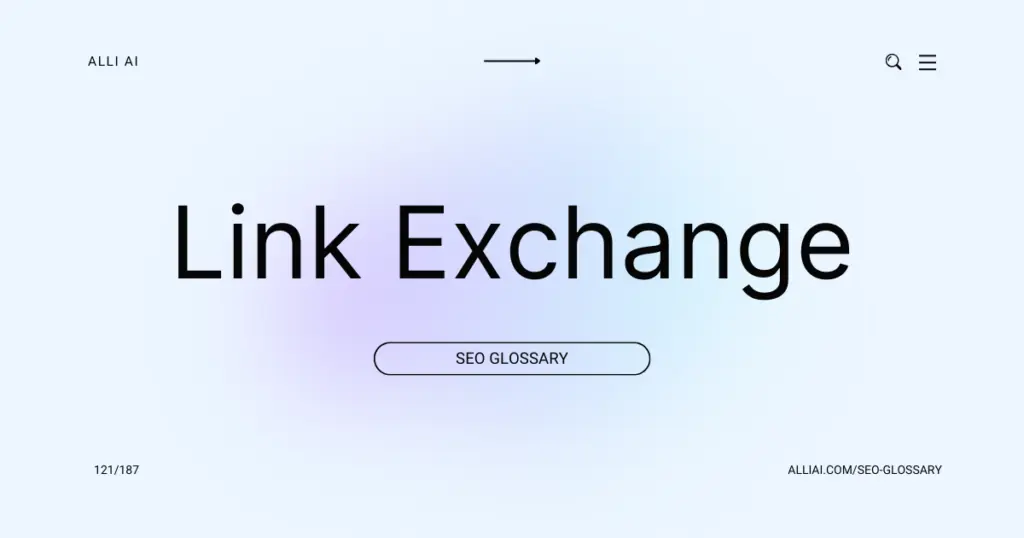What Does Link Exchange Mean?
Link exchange is the practice where two website owners agree to link to each other’s sites with the aim of boosting SEO and increasing visibility by leveraging each other’s web traffic. It is often used to improve site authority and search engine ranking.
Where Does Link Exchange Fit Into The Broader SEO Landscape?
Link exchange, commonly referred to as reciprocal linking, involves two websites agreeing to link to each other with the intent of enhancing SEO by demonstrating interconnected relevance and value to search engines. This practice was once a prevalent method for sites to increase their link popularity and improve their search engine rankings. However, its significance in SEO has diminished over time due to changes in search engine algorithms, particularly by Google, which now prioritizes the quality and relevancy of links over sheer quantity. Current SEO strategies focus more on earning high-quality, natural backlinks from authoritative sources rather than reciprocal linking, which might be perceived as manipulative if overused or improperly implemented. Consequently, link exchange must be approached with caution, ensuring it fits naturally within a broader SEO and content strategy to avoid penalties for link schemes.
Real Life Analogies or Metaphors to Explain Link Exchange
Link Exchange is like swapping baseball cards. You give one of your cards to a friend, and in return, they give you one of theirs. Each person hopes to get a card that complements their collection, making both collections more valuable.
How the Link Exchange Functions or is Implemented?
1. Identification of Partner Websites: Businesses identify and vet prospective websites in a similar niche that could be potential link exchange partners.
2. Outreach: The website owners or marketers contact each other, typically via email or social media, proposing a link exchange. This involves discussing the agreement details such as the type of link, the anchor text, and the placement.
3. Agreement on Terms: Both parties agree on the terms of the link exchange, including which pages will be linked to, the specific content or page the links will appear on, and how the links will be presented.
4. Link Placement: Each party adds a link on their website pointing to the other party’s website. This can be done manually through HTML editing or through a content management system (CMS). The links should be integrated naturally into relevant content, ensuring they provide value to users.
5. Verification: After the links are placed, each party verifies the other’s link. They check if the links are implemented as agreed upon—checking the URL, anchor text, and any agreed-upon attributes like “nofollow” or “dofollow”.
6. Monitoring: Both parties monitor the performance and impact of the exchange. This can include checking for increases in website traffic, improvements in search engine rankings, and overall site authority.
7. Maintenance: Periodically, parties revisit the link exchange to ensure the links are still active and relevant. Adjustments are made if necessary, either to the link itself or its placement, depending on performance metrics or changes in strategy.
8. Reporting: Parties may choose to report their findings and adjustments to each other to ensure continued benefit and alignment with SEO goals.
Throughout this process, it’s important that link exchanges adhere to search engine guidelines to avoid penalties for perceived manipulative practices.
Impact Link Exchange has on SEO
Link Exchange, the practice of trading links with other websites to boost SEO, can have varying impacts depending on execution:
1. Positive Impact: When performed judiciously with relevant, high-quality sites, Link Exchange can enhance authority and credibility, signaling to search engines that the site is a valuable resource, potentially improving rankings.
2. Negative Impact: If executed poorly, such as exchanging links with low-quality or irrelevant sites, it can lead to penalties from search engines like Google, negatively affecting SEO performance. This practice can appear manipulative, leading to a loss in search engine trust.
3. User Experience Impact: From a user experience standpoint, well-placed and relevant exchanged links can provide additional value by directing users to supplementary resources. Conversely, if the links feel spammy or irrelevant, they can detract from user experience, increasing bounce rates and reducing engagement.
SEO Best Practices For Link Exchange
1. Identify relevant websites in your niche that complement but do not compete directly with your content.
2. Evaluate the quality of potential link exchange partners by checking their domain authority, relevance, and audience engagement.
3. Reach out to the owners of selected websites via email, personalizing your message to explain the mutual benefits of a link exchange.
4. Agree on the specifics of the link exchange, including the exact URLs and anchor texts to be used.
5. Add the agreed-upon link to your website, ensuring it fits naturally within your content and provides value to your readers.
6. Provide your link partner with the URL where their link has been placed on your site, and verify when they have added your link to their site.
7. Monitor the link placements regularly to ensure they remain live and have not been altered without notification.
8. Measure the impact of the link exchange on your traffic and search engine rankings to assess the effectiveness.
9. Maintain an ongoing relationship with your link exchange partners for potential future collaborations or exchanges.
10. Periodically revisit and review your link exchange strategy to adapt to any changes in search engine algorithms or shifts in your website’s focus.
Common Mistakes To Avoid
1. Quality over Quantity: Engaging in link exchanges with low-quality or spammy sites can harm your SEO. Focus on exchanging links with reputable, relevant sites.
2. Relevance of Links: Exchanging links with sites that have no relevance to your content can dilute your website’s topic authority. Always ensure that the websites you exchange links with are relevant to your niche.
3. Reciprocal Links: Search engines might devalue reciprocal links or even penalize sites that excessively engage in reciprocal linking. To minimize risks, keep reciprocal links to a minimum and ensure they make sense from a user perspective.
4. Ignoring Nofollow Attributes: Not using ‘nofollow’ attributes when necessary can lead to search engine penalties. Use ‘nofollow’ judiciously to point out which links are part of advertisements or are not vouched for by your site.
5. Link Farms and Networks: Participating in link farms or automated link exchange programs can result in a penalty from search engines. Avoid any system that offers mass linking opportunities with little effort.
6. Anchor Text Over-Optimization: Using the same exact-match anchor text for all the inbound links can trigger spam filters. Vary your anchor text and make it look as natural as possible.
7. Neglecting Local SEO: For businesses relying on local clientele, engaging in link exchanges that don’t cater to a local audience can be a misstep. Prioritize local sites and community-driven content for link exchanges.
8. Lack of a Link Monitoring System: Not monitoring your backlink profile regularly can lead to issues with bad links or broken links, which can affect your site’s SEO health. Regularly audit your links and address any issues swiftly.
9. Violation of Webmaster Guidelines: Understand and follow the webmaster guidelines provided by search engines like Google. Ignorance of these guidelines when conducting link exchanges can lead to sanctions or penalties.
10. Ignoring Content Quality: Exchanging links should not be your only SEO strategy. Ensure that the content on your own site is high-quality, informative, and user-focused to naturally attract links.
11. Transactional Exchanges: Treat link exchanges not as transactions, but as opportunities to build relationships and network with other webmasters. Focusing solely on the transactional nature can lead to short-term and unsustainable link building.






